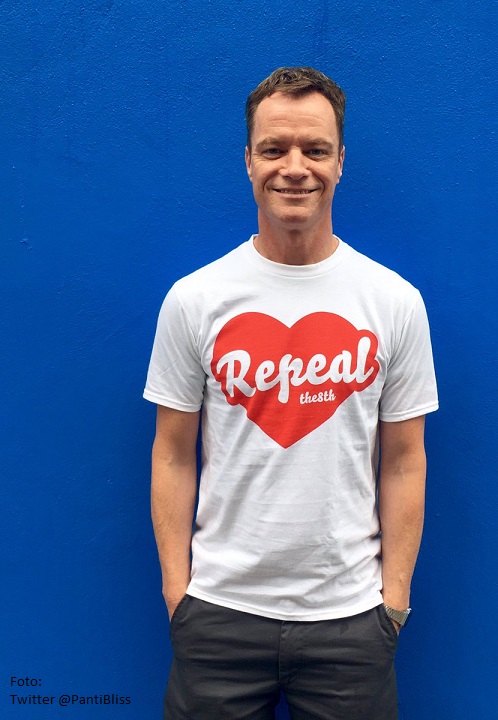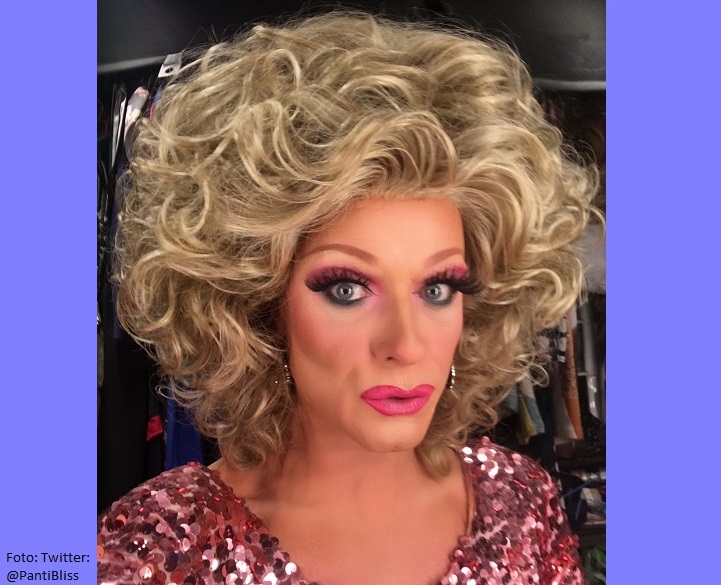The Dutch magazine hello gorgeous spoke to Rory O'Neill (47). In Ireland and far beyond the country's borders, he is known as the Drag queen Panti Bliss. "Unfortunately, many people don't dare to be open about their HIV infection."
"Since Panti mainstream I have to think carefully about what I say, because she is now sometimes taken so terribly seriously." So said Rory O'Neill, who rose to international fame as Panti Bliss in 2014, after an incident on Irish television in which she accused some media personalities of homophobia. In an eloquent speech some time later, Panti clarified her statement. The speech went around the world and got millions of views on YouTube.
2015 was the year in which Ireland voted in a referendum to open up civil marriage to people of the same sex. "It was funny and somehow humiliating. Along with many volunteers from the LGBTI community, I went door-to-door and knocked on doors to beg for the same rights that other people have. I don't know how I would have felt if the result of the referendum had been 'no'.
"If you ask me how I became an activist, then I can't answer that question so easily. People call Panti 'the LGBTI fighter', but I don't really see myself that way. In my head, activists are people in smoke-filled rooms who are upset about the system or a certain situation and are busy making pamphlets and posters. If I'm an activist, I'm a very selfish one. It has to be about something that affects me personally and about which I realise that others feel the same way. Then I'm definitely prepared to speak out. While all these other real activists are doing the real work.
Life as a panti
Rory's introduction to the topic Drag carried out, after spending a summer visiting his brother in London and falling under the spell of Leigh Bowery. "Leigh was this big, bizarre underground Entertainer who amazed everyone with his costumes and performances. I was fascinated by this man who lived his life completely on his own terms: I found him sublime and captivating. As an ordinary boy from a remote Irish village, I had never thought that such a life could be possible for me.
Of course, sometimes I don't feel like it. Then I'm sitting in a dressing room somewhere with my clothes around me again; and then I know that I just have to go through with the two-hour ritual that I've repeated thousands of times. But I have to say: once the make-up has been applied and this exaggerated woman I play has people around her again, it's also a very rewarding task.
Depending on the workload, I may be panti for many evenings in a row. I definitely try to spend a few hours every Sunday as my alter ego in my own pub. Then I listen to music and have my photo taken with tourists. But Panti also gives talks, she has media appearances and is expected to be at certain events. She also performs in her own theatre show. These shows are always a mixture of Stand-up comedy and cabaret in monologue form. Panti loves to talk and talks a lot."

"What I see as a problem is the stigma that dominates everything, the taboo of talking about HIV."
"As Panti, I am regularly approached by men who tell me about their HIV infection. For example, that they have just been diagnosed or that they have been carrying HIV around with them as a secret for years. I myself have always been open about the fact that I am HIV-positive. I have to be able to talk straight about such things. But maybe it was also easier for me because I was part of the gay scene and ran around in high heels."
At the moment, it definitely means that I am the only known Irishman who has HIV publicly. As a result, men who are also HIV-positive and have questions about it, or who just want to talk to someone, come to me. I always have an open ear and I try to reassure people. Because look: I take my pills every morning without giving it much thought. The rest of the day it's no longer an issue for me. When I was diagnosed in 1995, the world looked very different."
"Sometimes people accuse me of not taking things seriously enough. But well, I can only speak for myself. I have no symptoms and HIV hardly causes me any difficulties in my everyday life. What I do see as a problem, however, is the stigma that dominates everything, the taboo on talking about HIV. This means that people are afraid to get tested. Or that they keep quiet if they are diagnosed as HIV-positive. This leads to all kinds of psychological - or, if you don't take your pills - health problems.
If all people with HIV in Ireland came out tomorrow, the stigma would be gone the day after tomorrow. We have also seen this in Ireland in recent years with homosexuality. A lot of gays, lesbians and bisexuals have come out, so nowadays almost everyone knows someone who is "like that". This makes it much easier for society to grant these people the same rights that everyone else has."
"I wish I could hand out PrEP in my bar."
Nowadays you can get tested in the basement of the Panti Bar on some weekends. This saves you a trip to the clinic. It's really important to get tested regularly, because the sooner you discover an infection, the better it is for your own health and that of other people. I wish I could hand out PrEP in my bar. Developments can't happen fast enough for me! As I said, I don't see my own HIV infection as a problem, but I can see that it can be a problem for others. And the sooner we can stop HIV, the better. That's why I never say 'no' when I'm asked if I'm available for an interview on this topic."
Dutch originalText: Gerrit Jan Wielinga. Text edited.
More Panti!

Search on YouTube for Panti's Noble Call' for her now world-famous speech about homophobia and how it oppresses people.
Watch the documentary film Queen of Ireland on. Among other things, the film is about the role Panti played during the Irish referendum on the opening up of marriage.
Visit the Panti Bar online at pantibar.com. And if you're ever in Dublin, why not pop in for a drink?









